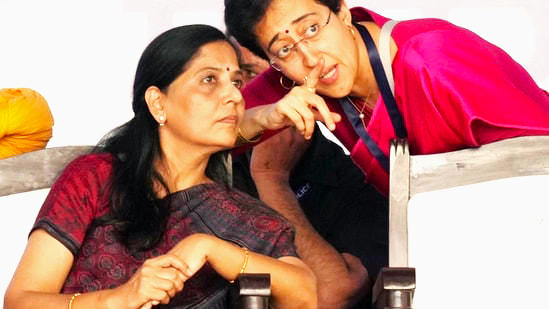In response to the Delhi court’s decision to extend Chief Minister Arvind Kejriwal’s Enforcement Directorate custody, his wife Sunita Kejriwal expressed her strong disapproval of the BJP-led central government. Sunita’s scathing attack on the government was fueled by her belief that they were deliberately keeping her husband in jail in order to hinder the Aam Aadmi Party’s (AAP) campaign for the upcoming Lok Sabha elections. She vehemently condemned what she perceived as a dictatorial approach by the ruling party and called upon the people of the country to respond to this perceived injustice.
Sunita Kejriwal’s accusations of dictatorship reflect the deep-rooted tensions between the AAP and the BJP. The ongoing power struggle between these two political parties has been marked by intense rivalry and a clash of ideologies. While the AAP has positioned itself as a champion of the common man, vowing to fight against corruption and promote transparency in governance, the BJP has accused them of being anti-national and obstructing the development agenda of the central government.
The arrest of Arvind Kejriwal, who has been a vocal critic of the BJP, has further exacerbated the already strained relationship between the two parties. Sunita’s claim that her husband’s custody extension is politically motivated is not unfounded, as it is not uncommon for opposition leaders to face legal challenges in the run-up to elections. This tactic, often employed by ruling parties, aims to weaken the opposition by tarnishing their image and disrupting their campaign efforts.
The BJP, on the other hand, has dismissed Sunita’s allegations, labeling her as “Rabri Devi in making.” This reference to the wife of former Bihar Chief Minister Lalu Prasad Yadav, who was accused of wielding power behind the scenes while her husband was in office, seeks to undermine Sunita’s credibility and portray her as a puppeteer manipulating her husband’s political career.
The political landscape in India is characterized by such heated exchanges and accusations, as parties vie for power and attempt to gain an upper hand in the public eye. The upcoming Lok Sabha elections, which will determine the composition of the central government, have intensified these rivalries and heightened the stakes for all political actors involved.
As the battle for power rages on, it remains to be seen how the people of India will respond to Sunita Kejriwal’s claims of dictatorship and the BJP’s counter-accusations. The outcome of the elections will not only shape the future of the country but also determine the trajectory of the AAP-BJP rivalry. In the midst of this political turmoil, the voices of the common people, who will ultimately decide the fate of the nation, must be heard and their concerns addressed. Only then can India truly progress towards a more inclusive and democratic society.
Political Turmoil and Arrest
The arrest of Arvind Kejriwal, the Chief Minister of Delhi, has sparked a wave of controversy and political turmoil. The ongoing clash between the Aam Aadmi Party (AAP) and the Bharatiya Janata Party (BJP) has reached new heights with this recent development. The arrest comes as a result of the Chief Minister’s alleged involvement in a corruption case.
Arvind Kejriwal’s wife, Sunita Kejriwal, has been an outspoken supporter of her husband throughout his political career. Her recent claims of “dictatorship” by the BJP-led central government have further intensified the already heated political atmosphere.
The arrest of Arvind Kejriwal has not only divided the political landscape of Delhi but has also ignited a nationwide debate on the state of democracy and the misuse of power. Supporters of the AAP argue that the arrest is a politically motivated move by the BJP to suppress opposition voices and undermine the credibility of the Chief Minister.
On the other hand, BJP supporters believe that the arrest is a necessary step in upholding the rule of law and fighting corruption. They argue that no one, regardless of their position, should be above the law. The BJP-led central government has defended the arrest, stating that it is based on concrete evidence and not influenced by political motives.
Meanwhile, the arrest has triggered widespread protests and demonstrations across the country. Supporters of the AAP have taken to the streets, demanding the immediate release of Arvind Kejriwal and accusing the BJP of using the legal system as a tool to suppress dissent. These protests have further heightened tensions between the AAP and the BJP, with both sides blaming each other for the deteriorating political climate.
In the midst of this political turmoil, Sunita Kejriwal has emerged as a vocal critic of the BJP-led central government. She has accused the government of misusing its power and attempting to silence opposition voices. In a series of tweets and public statements, she has called for unity among opposition parties and urged the people of Delhi to stand up against what she perceives as an attack on democracy.
The arrest of Arvind Kejriwal has not only affected the political landscape but has also raised questions about the effectiveness of the justice system in dealing with corruption cases. Critics argue that the arrest is just one example of a larger problem of selective targeting and political vendettas. They argue that there needs to be a more transparent and unbiased approach to dealing with corruption allegations, ensuring that no one is unfairly targeted or protected based on their political affiliations.
As the legal battle unfolds, the political future of Arvind Kejriwal hangs in the balance. The outcome of the case will not only determine his fate but also have significant implications for the AAP and the BJP. The arrest has further polarized the political landscape, making it increasingly difficult to find common ground and work towards the betterment of the people.
Sunita Kejriwal’s allegations against the central government are not without basis. Her claims of the arrest being a political tool used by the BJP to gain an advantage in the upcoming Lok Sabha elections are supported by a series of events that have unfolded in recent months. It is no secret that the relationship between the Aam Aadmi Party (AAP) and the Bharatiya Janata Party (BJP) has been strained, with both parties engaging in heated debates and public spats.
Sunita Kejriwal’s assertion of “dictatorship” is not merely a rhetorical flourish, but a reflection of her deep concerns about the state of democracy in the country. She believes that the government’s actions go beyond mere political maneuvering and are a deliberate attempt to suppress the opposition. The arrest of Arvind Kejriwal, in her view, is a blatant example of the government’s misuse of power to stifle dissent and hinder the AAP’s campaign efforts.
The timing of the arrest is particularly suspicious, as it comes just months before the Lok Sabha elections. Sunita Kejriwal argues that this is not a coincidence, but a calculated move by the ruling party to weaken the AAP’s chances of success. She points to the fact that other opposition leaders have also faced similar charges and arrests, further supporting her claim that this is a systematic attempt to silence any voice that opposes the government.
Furthermore, Sunita Kejriwal’s allegations are not isolated incidents. There have been numerous instances in the past where the central government has been accused of using its power to target political opponents. Critics argue that such actions undermine the very essence of democracy and erode the trust of the people in the government.
In response to these allegations, the central government has maintained that the arrest of Arvind Kejriwal is a result of a fair and impartial investigation. They argue that the law should be allowed to take its course and that no one is above the law, regardless of their political affiliations. However, Sunita Kejriwal and many others remain unconvinced, citing a lack of concrete evidence and a perceived bias in the handling of the case.
Ultimately, the allegations made by Sunita Kejriwal against the central government raise important questions about the state of democracy in India. They highlight the need for a robust and independent judiciary that can ensure the fair and impartial treatment of all individuals, regardless of their political standing. Only through such measures can the trust of the people be restored and democracy be preserved.
BJP’s Response
The BJP, on the other hand, has dismissed Sunita Kejriwal’s allegations as baseless and politically motivated. They have accused her of resorting to personal attacks and have likened her to Rabri Devi, the wife of former Bihar Chief Minister Lalu Prasad Yadav. This comparison suggests that Sunita Kejriwal is simply following in the footsteps of other political spouses who have used emotional appeals to gain sympathy and support.
The BJP’s response to Sunita Kejriwal’s claims reflects their determination to counter the narrative put forth by the AAP and its supporters. By labeling her as “Rabri Devi in making,” the BJP aims to undermine her credibility and portray her as someone who is using her husband’s arrest for personal and political gain.
Furthermore, the BJP has questioned the timing of Sunita Kejriwal’s allegations, pointing out that they conveniently surfaced just before the upcoming state elections. They argue that it is a well-known tactic of the opposition parties to create controversies and divert attention from the real issues at hand. The BJP asserts that Sunita Kejriwal’s claims are nothing more than a desperate attempt to tarnish the party’s image and gain political mileage.
In addition to questioning the motives behind Sunita Kejriwal’s allegations, the BJP has also raised doubts about the veracity of her claims. They have called for a thorough investigation into the matter and have expressed confidence that the truth will eventually come out. The party has emphasized the need for due process and has stated that they will fully cooperate with any investigation to ensure justice is served.
Moreover, the BJP has highlighted the achievements of the government under their leadership, emphasizing their commitment to good governance, development, and the welfare of the people. They argue that Sunita Kejriwal’s allegations are a distraction from the party’s accomplishments and the positive changes they have brought to the state.
Overall, the BJP’s response to Sunita Kejriwal’s allegations is a mix of dismissing her claims as politically motivated, questioning her credibility, and redirecting the focus to their own achievements. The party is determined to counter the narrative put forth by the AAP and its supporters and aims to maintain their stronghold in the upcoming state elections.
Public Reaction and the Lok Sabha Elections
The arrest of Arvind Kejriwal and the subsequent allegations made by Sunita Kejriwal have generated widespread public interest and debate. Many people are divided on the issue, with some supporting the Chief Minister and his wife’s claims of political vendetta, while others believe that the arrest is justified based on the evidence presented.
The upcoming Lok Sabha elections add another layer of complexity to the situation. With political parties vying for power, the arrest of a prominent leader like Arvind Kejriwal becomes a key talking point. The public’s reaction to this event will undoubtedly influence the electoral outcome in Delhi and potentially have wider implications for the national political landscape.
As news of the arrest spread, social media platforms were flooded with discussions and opinions from citizens across the country. Hashtags related to the incident started trending, with supporters and critics of Kejriwal expressing their views passionately. This online discourse further fueled the already heated debate surrounding the arrest.
Public opinion polls conducted in the aftermath of the arrest reflected the divided sentiment among the electorate. While some respondents believed that the arrest was a politically motivated move to suppress Kejriwal’s influence, others saw it as a necessary step in upholding the rule of law. The differing views were not limited to political affiliations, with individuals from all walks of life expressing their stance on the matter.
The arrest of a prominent political figure like Arvind Kejriwal has also sparked protests and demonstrations in various parts of the country. Supporters of the Chief Minister organized rallies and marches, demanding his release and condemning what they perceive as an attack on democracy. On the other hand, there were also counter-protests by those who believe that Kejriwal should be held accountable for his alleged wrongdoings.
The Lok Sabha elections, scheduled to take place in a few months, have further intensified the public’s interest in the arrest. Political parties have been quick to capitalize on the situation, incorporating it into their campaign strategies. The ruling party has portrayed the arrest as a necessary step to cleanse politics, while the opposition parties have criticized it as an attempt to silence dissenting voices.
The outcome of the Lok Sabha elections in Delhi will be closely watched, as it will serve as an indicator of the public’s perception of the arrest and its impact on the political landscape. The results could potentially influence the strategies of political parties at the national level, as they assess the public’s response to the arrest and adjust their campaigns accordingly.
Looking ahead, the arrest and allegations surrounding Arvind Kejriwal have undoubtedly created a sense of uncertainty within the Aam Aadmi Party. The party will need to carefully navigate these turbulent waters in order to maintain its electoral prospects. One strategy that the party may employ is to rally its supporters and reinforce its core values and principles. By reminding the public of its commitment to fighting corruption and advocating for the rights of the common man, the party can attempt to regain the trust and confidence of the voters.
However, it will not be an easy task for the Aam Aadmi Party. The allegations made by Sunita Kejriwal have the potential to tarnish the party’s image and erode its support base. The BJP, on the other hand, will seize this opportunity to defend its actions and discredit the claims made against Arvind Kejriwal. The party will likely launch a robust campaign to undermine the opposition and strengthen its own position in the political arena.
As the legal proceedings unfold and the political drama continues, it is crucial to remember that it is ultimately the people of the country who hold the power to shape the future of Indian politics. The upcoming Lok Sabha elections will provide a platform for voters to express their views and make a decision on the direction they want the country to take.
The arrest of Arvind Kejriwal and the subsequent allegations made by his wife will undoubtedly play a significant role in shaping public opinion and influencing the outcome of the elections. The voters will have to carefully evaluate the evidence and weigh the credibility of the accusations before casting their votes.
Regardless of the outcome, it is vital for all stakeholders to uphold the principles of democracy and ensure that the voice of the people is heard and respected. The political landscape will continue to evolve, but it is imperative that the values of transparency, accountability, and fairness are upheld throughout the process.







